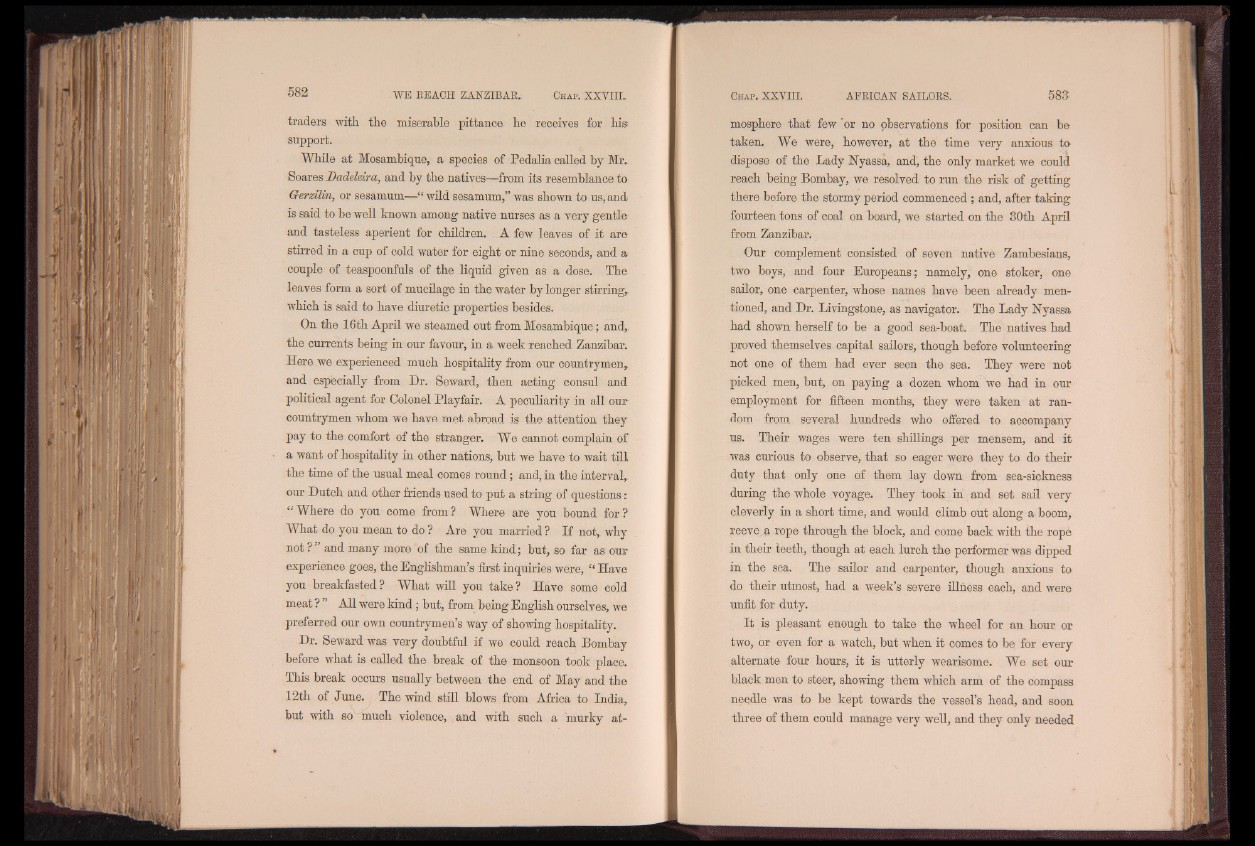
traders with the miserable pittance he receives for his
support.
While at Mosambique, a species of Pedalia called by Mr.
Soares Dadeldra, and by the natives—from its resemblance to
Gendlin, or sesamum—“ wild sesamum,” was shown to us, and
is said to be well known among native nurses as a very gentle
and tasteless aperient for children. A few leaves of it are
stirred in a cup of cold water for eight or nine seconds, and a
couple of teaspoonfuls of the liquid given as a dose. The
leaves form a sort of mucilage in the water by longer stirring,
which is said to have diuretic properties besides.
On the 16th April we steamed out from Mosambique; and,,
the currents being in our favour, in a week reached Zanzibar.
Here we experienced much hospitality from our countrymen,
and especially from Dr. Seward, then acting consul and
political agent for Colonel Playfair. A peculiarity in all our
countrymen whom we have met abroad is the attention they
pay to the comfort of the stranger. We cannot complain of
a want of hospitality in other nations, but we have to wait till
the time of the usual meal comes round; and, in the interval,
our Dutch and other friends used to put a string of questions:
“ Where do you come from? Where are you bound for?
What do you mean to do ? Are you married ? If not, why
not ? ’ and many more of the same kind; but, so far as our
experience goes, the Englishman’s first inquiries were, “ Have
you breakfasted? What will you take? Have some cold
meat ? ” All were kind; but, from being English ourselves, we
preferred our own countrymen’s way of showing hospitality.
Dr. Seward was very doubtful if we could reach Bombay
before what is called the break of the monsoon took place.
This break occurs usually between the end of May and the
12th of June. | The wind still blows from Africa to India,
but with so much violence, and with such a murky atmosphere
that few 'or no observations for position can be
taken. We were, however, at the time very anxious to
dispose of the Lady Nyassa, and, the only market we could
reach being Bombay, we resolved to run the risk of getting
there before the stormy period commenced ; and, after taking
fourteen tons of coal on board, we started on the 30th April
from Zanzibar.
Our complement consisted of seven native Zambesians,
two boys, and four Europeans; namely, one stoker, one
sailor, one carpenter, whose names have been already mentioned,
and Dr. Livingstone, as navigator. The Lady Nyassa
had shown herself to be a good sea-boat. The natives had
proved themselves capital sailors, though before volunteering
not one of them had ever seen the sea. They were not
picked men, but, on paying a dqzen whom we had in our
employment for fifteen months, they were taken at random
from several hundreds who offered to accompany
us. Their wages were ten shillings per mensem, and it
was curious to observe, that so eager were they to do their
duty that only one of them lay down from sea-sickness
during the whole voyage. They took in and set sail very
cleverly in a short time, and would climb out along a boom,
reeve.a rope through the block, and come back with the rope
in their teeth, though at each lurch the performer was dipped
in the sea. The sailor and carpenter, though anxious to
do their utmost, had a week’s severe illness each, and were
unfit for duty.
I t is pleasant enough to take the wheel for an hour or
two, or even for a watch, but when it comes to be for every
alternate four hours, it is utterly wearisome. We set our
black men to steer, showing them which arm of the compass
needle was to be kept towards the vessel’s head, and soon
three of them could manage very well, and they only needed